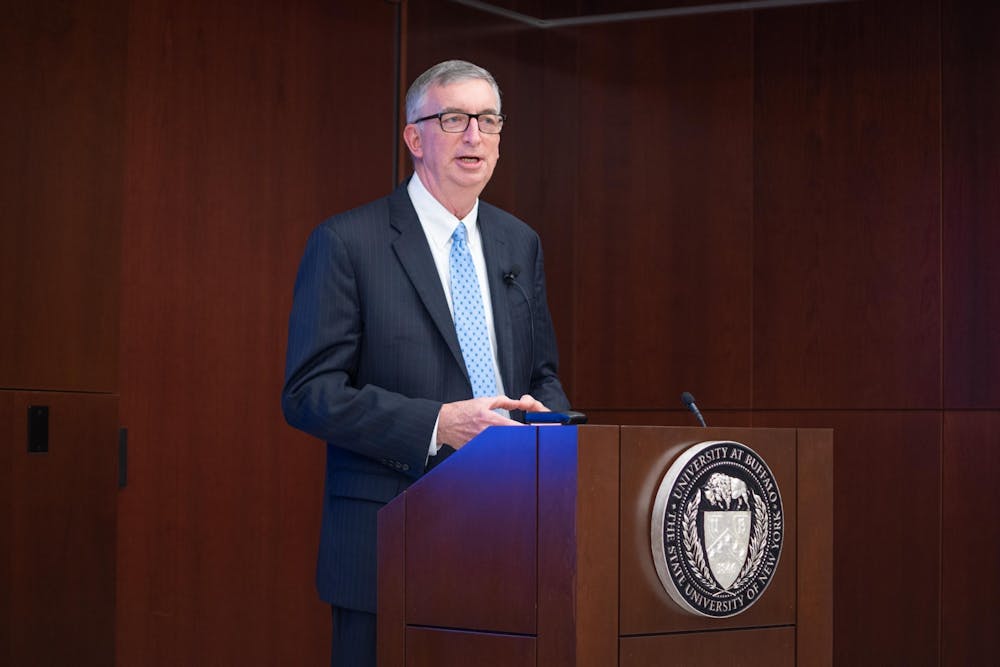Editor's note: This interview was recorded Tuesday morning around 11:30 a.m. This is a developing situation. For news, features and more information pertaining to the pandemic, please follow us on our Twitter. For updates as they happen, UB suggests following its COVID-19 informational website.
Life was different a week ago.
Students could sit in the Student Union lobby and socialize with classmates over coffee.
Students staying on campus could look forward to stopping by the gym at Alumni Arena.
A housing and dining plan refund was unthinkable.
But that’s not life today
With bubble-wrapped chairs on top of SU tables, closed fitness centers and students looking for housing refunds this week, life at a nearly 174-year-old university did a full 180 for many of its 30,000-plus students.
UB Provost A. Scott Weber recognizes this “changing” situation (before our interview, the housing refund news was hours away). He talked to The Spectrum via phone Tuesday as UB adjusts to a new reality: the coronavirus/COVID-19 global health pandemic has caused UB to shift to a “distance-learning” model effective March 23.
UB started planning for responses to the coronavirus/COVID-19 in January but Weber said he doesn’t think anybody could predict where we are today.
“Clearly, we had some concerns, we’re an international university and pandemics are what they are, organisms move very rapidly in the world today,” Weber said. “Obviously, [UB President Satish Tripathi] thought this kind of ‘detail-level’ of planning was required.”
Some of the planning involved creating an “advisory committee” for the university with three larger directives as “guiding principles,” he said. These directives include the health and safety of campus community members, academic continuity and research continuity for community members. Groups spiraled out thereafter, according to Weber, to look at “what it would take to go to ‘distance-learning’ and what the impacts on housing, dining” and other operations would be across the campus.
“Frankly, you’re in unprecedented territory,” Weber said.
Prior to the governor’s message, Weber asked deans and employees in the provost’s office and the Center for Educational Innovation on the weekend of March 6 to plan for a week-long session or “readiness drill” for faculty to shift to online for the week after spring break.
UB was prepared and on track to make a change, he said, but the situation changed so rapidly. Weber said there was a contingency plan if there was a pandemic but when you’re actually in it, it becomes very different.
“We’re actually in an unprecedented experiment in higher education where for years we’ve talked about moving more of our classes into a digital format, where our students might learn through a hybrid learning environment and that progress has been slow for a variety of reasons,” Weber said. “Now we just said within a week we’re going to do this.”
Weber says he thinks of the situation via a table analogy. Universities like UB were thinking at “table-level” in their planning processes. Now, universities are going “three feet above” the table as soon as the spring recess is over. Weber returns to his table analogy and asks: “Where will we be after this is all over?”
“I don’t think we’ll be back at the table but I don’t think we’ll be up three feet above it,” Weber said. “We don’t know yet where that next stasis is going to be but we are probably going to fundamentally be the same research-driven public institution who we have always been, that believes in access and the many things we share with the [community.] But I don’t think we’re probably going to deliver instruction in the same way [in the future].”
He said UB faculty are “mobilizing” and exhibiting an “amazing spirit of cooperation in very uncertain times.” Students, likewise, are thinking about the journey ahead and are “anxious and uncertain,” he said.
Weber said he was accustomed to writing notes in his classes as a student, and would have loved to “go back in classes” for clarity via capture technology, such as some video tools which some UB professors use (and will be using this semester). He said he sees the positives in this semester’s new “grand experiment” (which he “doesn’t mean in a cavalier way”) but still sees UB as an institution for people to “gather” and “communicate in a holistic manner.”
“That’s still going to be important for us in our overall mission, we’re not just simply going to move from where we are today to be a ‘distance-learning’ institution,” Weber said. “So are we going to transfer ourselves to ‘distance-learning?’ No. But are we going to be the same institution in terms of educational pedagogy that we were on the first of March? I don’t think so. Where we are in the experiment is still yet to be determined.”
The shift to “distance-learning” leaves a number of questions such as those for accredited programs that require a “necessary” in-person lab, where virtual labs might not fly for future students’ opportunities. He said, while the conversation hasn’t happened yet, accreditation boards nationwide may make special exceptions given the ongoing situation.
There’s also nursing, dentistry and other medical students who work in clinical environments, and he said UB is still “helping our students understand how they’re going to meet” their requirements this semester. He said deans are working with healthcare partners so students can work to the extent possible to satisfy any requirements.
There are other challenges for those living on-campus during this “unprecedented situation,” such as international students. UB could be “their home,” he said. There will be “curtailed services” on campus, such as gyms, but he said health and safety is a top priority for UB even if the community isn’t as robust as it was a month ago.
Over the past week, Erie County officials have announced locations in the Amherst community where people with confirmed cases have visited, such as the Barnes & Nobles on Niagara Falls Boulevard or the Wegmans on Alberta Drive. Weber said UB is working closely with the Erie County Department of Health along with other agencies to get guidance during this time.
Weber said UB won’t comment on any particular cases and said UB does not have one “to the best of his knowledge,” as of Tuesday morning. He said ECDOH provides guidance through its contact with the New York State Department of Health and the Centers for Disease Control and Prevention to do the “next level of outreach to the ring of community.”
The ECDOH does epidemiology and understands who a person with a confirmed case may have come in contact with, he said. That isn’t UB’s role, Weber said, which is to notify and collaborate with health entities.
As for seniors and graduate students in their last year, the big question is whether commencement weekend will happen in light of the Centers for Disease Control and Prevention recommendations to avoid gatherings of ten people or more.
“We want to do everything we can to acknowledge the success of our students but we won’t do that at the expense of protecting the health and safety of our students,” Weber said.
Weber said UB hasn’t made any “definite” decisions on graduation, as of Tuesday morning, but will continue to evaluate the event for a decision “soon” since students and families want to know.
“We are really continuing to try and think about, if we aren’t able to hold it, how we could recognize the student achievement we had,” Weber said.
He said, while it would be a big disappointment, he hopes students understand if UB has to cancel or postpone events as seminal as graduation.
“I don’t think we’ve ever had to curtail that in our almost 175-year history,” Weber said.
That “uncharted territory” also impacts other “seminal events,” such as Accepted Students Day, which is something UB can’t have at the moment, Weber said. UB is now considering alternative ways to engage with students, he said, such as virtual admissions events.
On a personal level, Weber sees the unique impact this has on each person.
He has out-of-state children and grandchildren and although he’d like to visit them, the social distancing guidelines weigh heavier.
“My situation is no more unique or less unique than anybody else,” Weber said. “This is life-altering in the short term and probably even in the long term because it will reconfigure some of the ways we socially interact and how we interact with others through a collegial work environment.”
He reiterates this is an experiment, one where he’s feeling “encouraged, excited, gratified and humbled” in how UB has “stepped up” to the challenge. He said faculty, staff and students are stepping up and preparing for a new model for the university.
“As an administrator, as a faculty member, as a colleague of my fellow faculty members, I can’t ask for more than that,” Weber said. “So I’m pretty proud of everyone [not just] on a personal level but on a university-efficient level.”
Benjamin Blanchet is the engagement editor and can be reached at benjamin.blanchet@ubspectrum.com and on Twitter @bencblanchet.

Benjamin Blanchet is the senior engagement editor for The Spectrum. His words have been seen in The Buffalo News (Gusto) and The Sun newspapers of Western New York. Loves cryptoquip and double-doubles.





